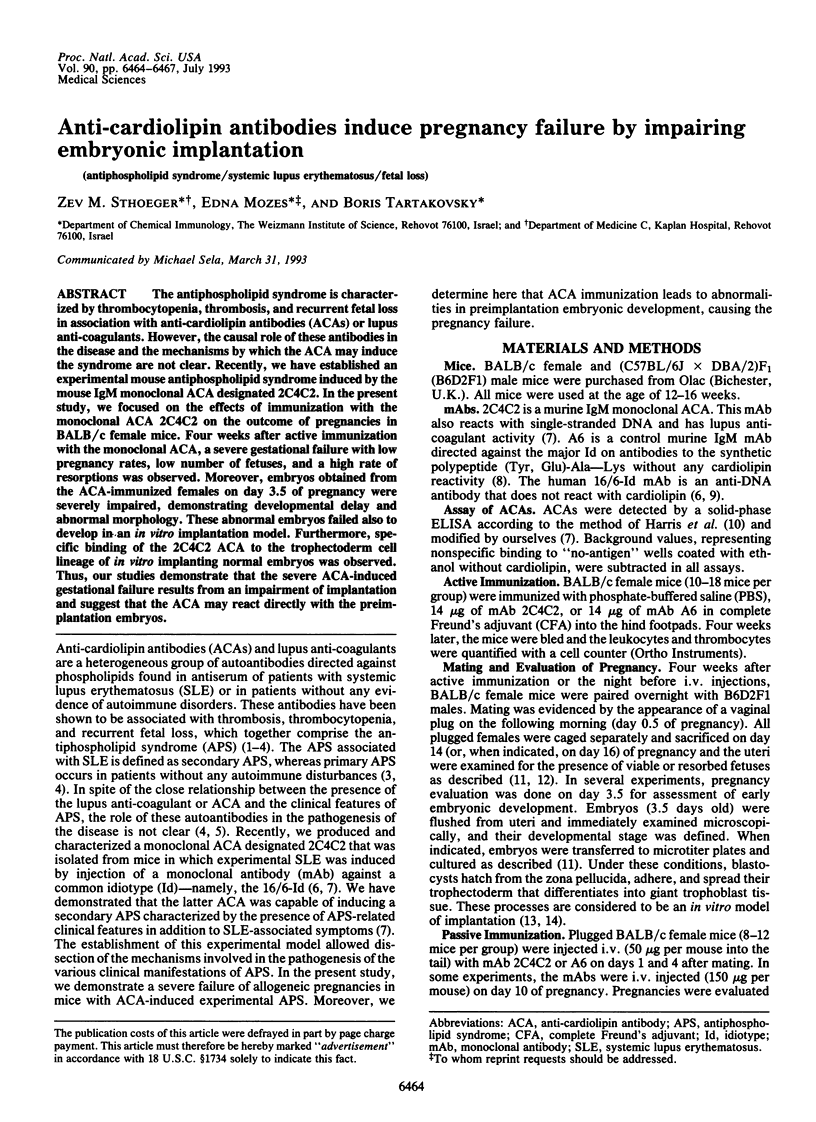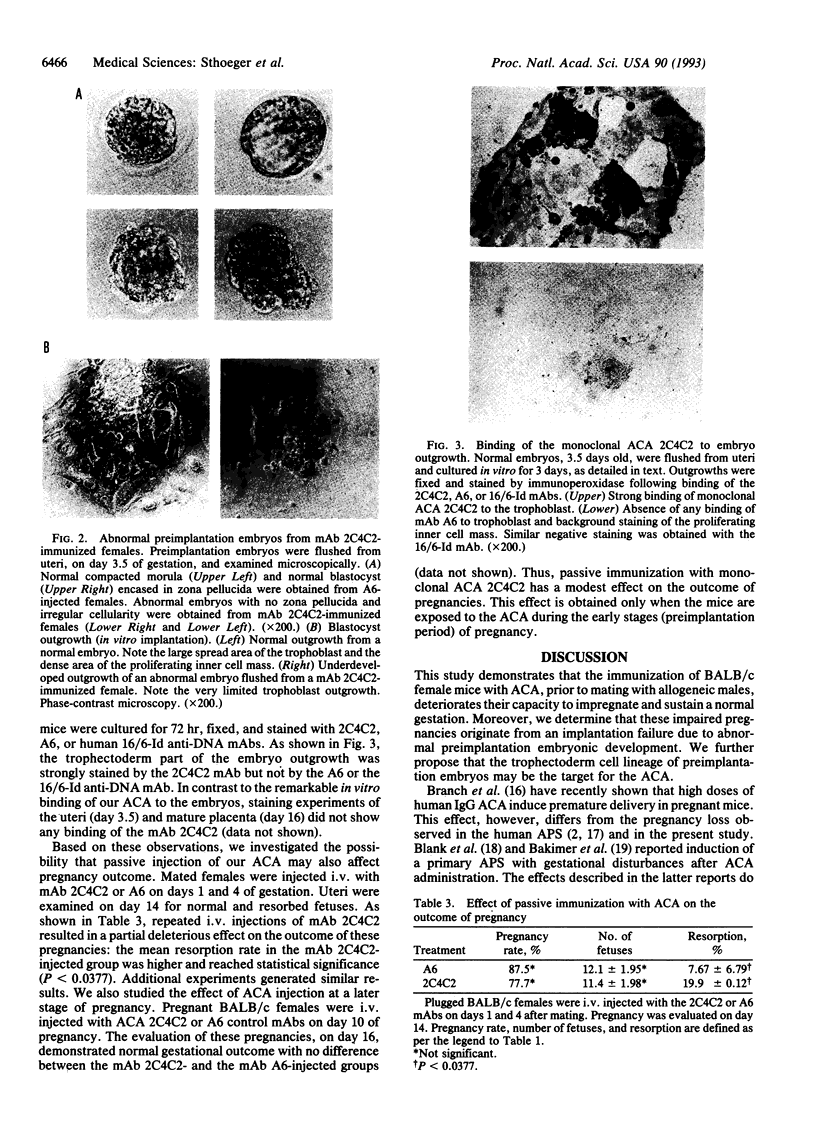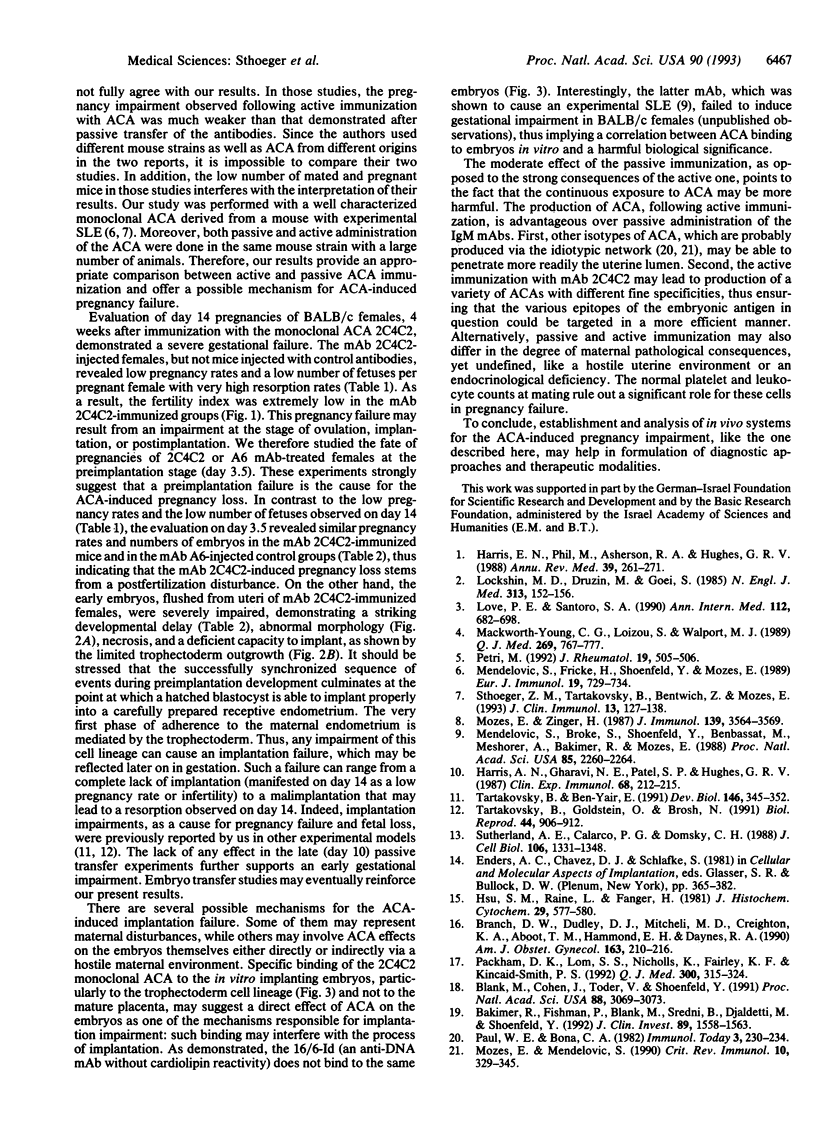Abstract
The antiphospholipid syndrome is characterized by thrombocytopenia, thrombosis, and recurrent fetal loss in association with anti-cardiolipin antibodies (ACAs) or lupus anti-coagulants. However, the causal role of these antibodies in the disease and the mechanisms by which the ACA may induce the syndrome are not clear. Recently, we have established an experimental mouse antiphospholipid syndrome induced by the mouse IgM monoclonal ACA designated 2C4C2. In the present study, we focused on the effects of immunization with the monoclonal ACA 2C4C2 on the outcome of pregnancies in BALB/c female mice. Four weeks after active immunization with the monoclonal ACA, a severe gestational failure with low pregnancy rates, low number of fetuses, and a high rate of resorptions was observed. Moreover, embryos obtained from the ACA-immunized females on day 3.5 of pregnancy were severely impaired, demonstrating developmental delay and abnormal morphology. These abnormal embryos failed also to develop in an in vitro implantation model. Furthermore, specific binding of the 2C4C2 ACA to the trophectoderm cell lineage of in vitro implanting normal embryos was observed. Thus, our studies demonstrate that the severe ACA-induced gestational failure results from an impairment of implantation and suggest that the ACA may react directly with the preimplantation embryos.
Full text
PDF



Images in this article
Selected References
These references are in PubMed. This may not be the complete list of references from this article.
- Bakimer R., Fishman P., Blank M., Sredni B., Djaldetti M., Shoenfeld Y. Induction of primary antiphospholipid syndrome in mice by immunization with a human monoclonal anticardiolipin antibody (H-3). J Clin Invest. 1992 May;89(5):1558–1563. doi: 10.1172/JCI115749. [DOI] [PMC free article] [PubMed] [Google Scholar]
- Blank M., Cohen J., Toder V., Shoenfeld Y. Induction of anti-phospholipid syndrome in naive mice with mouse lupus monoclonal and human polyclonal anti-cardiolipin antibodies. Proc Natl Acad Sci U S A. 1991 Apr 15;88(8):3069–3073. doi: 10.1073/pnas.88.8.3069. [DOI] [PMC free article] [PubMed] [Google Scholar]
- Branch D. W., Dudley D. J., Mitchell M. D., Creighton K. A., Abbott T. M., Hammond E. H., Daynes R. A. Immunoglobulin G fractions from patients with antiphospholipid antibodies cause fetal death in BALB/c mice: a model for autoimmune fetal loss. Am J Obstet Gynecol. 1990 Jul;163(1 Pt 1):210–216. doi: 10.1016/s0002-9378(11)90700-5. [DOI] [PubMed] [Google Scholar]
- Harris E. N., Asherson R. A., Hughes G. R. Antiphospholipid antibodies--autoantibodies with a difference. Annu Rev Med. 1988;39:261–271. doi: 10.1146/annurev.me.39.020188.001401. [DOI] [PubMed] [Google Scholar]
- Harris E. N., Gharavi A. E., Patel S. P., Hughes G. R. Evaluation of the anti-cardiolipin antibody test: report of an international workshop held 4 April 1986. Clin Exp Immunol. 1987 Apr;68(1):215–222. [PMC free article] [PubMed] [Google Scholar]
- Hsu S. M., Raine L., Fanger H. Use of avidin-biotin-peroxidase complex (ABC) in immunoperoxidase techniques: a comparison between ABC and unlabeled antibody (PAP) procedures. J Histochem Cytochem. 1981 Apr;29(4):577–580. doi: 10.1177/29.4.6166661. [DOI] [PubMed] [Google Scholar]
- Lockshin M. D., Druzin M. L., Goei S., Qamar T., Magid M. S., Jovanovic L., Ferenc M. Antibody to cardiolipin as a predictor of fetal distress or death in pregnant patients with systemic lupus erythematosus. N Engl J Med. 1985 Jul 18;313(3):152–156. doi: 10.1056/NEJM198507183130304. [DOI] [PubMed] [Google Scholar]
- Love P. E., Santoro S. A. Antiphospholipid antibodies: anticardiolipin and the lupus anticoagulant in systemic lupus erythematosus (SLE) and in non-SLE disorders. Prevalence and clinical significance. Ann Intern Med. 1990 May 1;112(9):682–698. doi: 10.7326/0003-4819-112-9-682. [DOI] [PubMed] [Google Scholar]
- Mackworth-Young C. G., Loizou S., Walport M. J. Antiphospholipid antibodies and disease. Q J Med. 1989 Sep;72(269):767–777. [PubMed] [Google Scholar]
- Mendlovic S., Brocke S., Shoenfeld Y., Ben-Bassat M., Meshorer A., Bakimer R., Mozes E. Induction of a systemic lupus erythematosus-like disease in mice by a common human anti-DNA idiotype. Proc Natl Acad Sci U S A. 1988 Apr;85(7):2260–2264. doi: 10.1073/pnas.85.7.2260. [DOI] [PMC free article] [PubMed] [Google Scholar]
- Mendlovic S., Fricke H., Shoenfeld Y., Mozes E. The role of anti-idiotypic antibodies in the induction of experimental systemic lupus erythematosus in mice. Eur J Immunol. 1989 Apr;19(4):729–734. doi: 10.1002/eji.1830190424. [DOI] [PubMed] [Google Scholar]
- Mozes E., Mendlovic S. The role of anti-DNA idiotype antibodies in systemic lupus erythematosus. Crit Rev Immunol. 1990;10(4):329–345. [PubMed] [Google Scholar]
- Mozes E., Zinger H. Characterization and biologic activities of an anti-idiotype-specific T cell line and its derived clones. J Immunol. 1987 Dec 1;139(11):3564–3569. [PubMed] [Google Scholar]
- Packham D. K., Lam S. S., Nicholls K., Fairley K. F., Kincaid-Smith P. S. Lupus nephritis and pregnancy. Q J Med. 1992 Apr;83(300):315–324. [PubMed] [Google Scholar]
- Petri M. The clinical syndrome associated with antiphospholipid antibodies. J Rheumatol. 1992 Apr;19(4):505–507. [PubMed] [Google Scholar]
- Sthoeger Z. M., Tartakovsky B., Bentwich Z., Mozes E. Monoclonal anticardiolipin antibodies derived from mice with experimental lupus erythematosus: characterization and the induction of a secondary antiphospholipid syndrome. J Clin Immunol. 1993 Mar;13(2):127–138. doi: 10.1007/BF00919269. [DOI] [PubMed] [Google Scholar]
- Sutherland A. E., Calarco P. G., Damsky C. H. Expression and function of cell surface extracellular matrix receptors in mouse blastocyst attachment and outgrowth. J Cell Biol. 1988 Apr;106(4):1331–1348. doi: 10.1083/jcb.106.4.1331. [DOI] [PMC free article] [PubMed] [Google Scholar]
- Tartakovsky B., Ben-Yair E. Cytokines modulate preimplantation development and pregnancy. Dev Biol. 1991 Aug;146(2):345–352. doi: 10.1016/0012-1606(91)90236-v. [DOI] [PubMed] [Google Scholar]
- Tartakovsky B., Goldstein O., Brosh N. Colony-stimulating factor-1 blocks early pregnancy in mice. Biol Reprod. 1991 May;44(5):906–912. doi: 10.1095/biolreprod44.5.906. [DOI] [PubMed] [Google Scholar]




